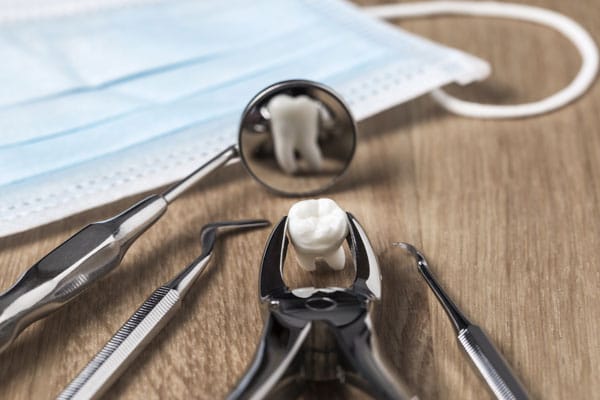
What Are Wisdom Tooth Extraction
Wisdom teeth, also known as third molars, are the final set of molar teeth that appear in the back of the mouth. They form at a mature age, typically between 17 years and 21 years. Most people have four wisdom teeth, two in both the upper and lower jaw, and one on each side. If wisdom teeth come out in an aligned position, they do not cause any discomfort and serve the same chewing and grinding purposes as other molars.
Many experienced doctors evaluate the position of the wisdom teeth before they grow, and may recommend that the wisdom tooth be removed before it fully grows and causes pain.
What Are Impacted Wisdom Teeth?
There are many factors that contribute to the pain caused by misaligned wisdom teeth, such as cavities and the growth of bacteria. Food can also get trapped in the space between existing molar and wisdom teeth. This is because it is hard to clean that area when flossing or brushing.
When there’s not enough room in your jaw for wisdom teeth to develop, it emerges at an abnormal angle. This wisdom tooth is known as ‘Impacted Wisdom Tooth’. These teeth may get stuck under your gum or grow at an angle that crowds or damages the other teeth. It can also form a cyst which can damage the bone or roots of near teeth. Such situations inflict pain and discomfort. This is why experienced orthodontists and oral physicians strongly recommend getting your wisdom tooth extracted as soon as the symptoms occur.
If left unattended, impacted wisdom teeth can cause an infection in the mouth, which makes treatment complicated. The symptoms of an impacted wisdom tooth are as follows:
- Red gums with swelling
- Swelling around or of the jaw itself
- Problems opening your mouth
- Pain and swelling behind the teeth
- An unpleasant taste in your mouth
- Bad breath
Why Do Dentist Recommend Wisdom Tooth Removal?
All experienced physicians recommend getting your wisdom tooth extracted when it produces symptoms of discomfort. They strongly recommend having oral surgery to remove the impacted wisdom teeth to avoid potential risks. Impacted wisdom teeth may cause cysts, cavities, and infections in your mouth, even if they don’t produce any symptoms.
Food can get trapped in between teeth as mere flossing does not reach the back area. The worst complication which arises by not removing impacted wisdom teeth is that they may destroy the gums and roots, damaging the adjacent teeth.
However, there is no need to remove wisdom teeth if they are not impacted. Thus, it is necessary to have a dental evaluation, where dentists can take an X-ray to determine the alignment the wisdom teeth will take.
How Are Wisdom Teeth Removed?
Wisdom teeth are removed by specialized and experienced oral surgeons. Also, an experienced dentist can remove it. Determining which physician is best suited for the removal procedure is determined by checking how impacted your wisdom tooth is through an X-ray.
Before the surgery, your physician will numb the tooth and its surrounding area. For this, they’ll administer local anesthesia and you won’t be able to feel pain but might experience some pressure and movements during surgery.
If the wisdom tooth has not fully erupted, the doctor will make an incision in the gum to access the tooth. The procedure may also require the surgeon to remove a bone covering the tooth in case of severe misalignment of the wisdom teeth. The tooth is broken down into few pieces so that it’s easier and less painful to extract from the gum. The doctor will then widen the tooth socket by wobbling the tooth back and forth.
Once the tooth is removed, the incision is stitched back together and stitches get dissolve usually within 1-2 weeks.
- (425)998-8109
Let Us Help Provide Best Wisdom Tooth Extraction
Wisdom Tooth Extraction are completely safe and prevent permanent bone loss in your teeth. Wisdom Tooth Extraction help you get a beautiful smile.
Frequently asked questions
Is it painful to get wisdom teeth removed?
During the procedure, the doctors inject local anesthesia in the area of the extraction. The area becomes numb; therefore, you are not likely to feel any pain during surgery. Mild discomfort due to pressure exerted before extracting the tooth is normal. However, after the surgery, you must take care of your oral hygiene. Your dentist may place a gauze over the site of the extraction and ask you to keep the pressure on it. Blood clots are also a part of the healing process. Your doctor may also prescribe antibiotics if you had any infection prior to the surgery. For 24 hours after the extraction, avoid rinsing the mouth, and drinking alcohol or any hot beverages.
How much recovery time is required after wisdom tooth removal?
Most people fully recover within 3 to 4 days. In some cases, after extracting the wisdom tooth, a dry socket may emerge. Dry socket appears because a blood clot which was supposed to protect the gums, dislodges, leaving the nerves and gums exposed. A dry socket only delays the healing process by 7 to 10 days. However, it is necessary to consult your physician to prevent any infection from developing due to dry socket.
